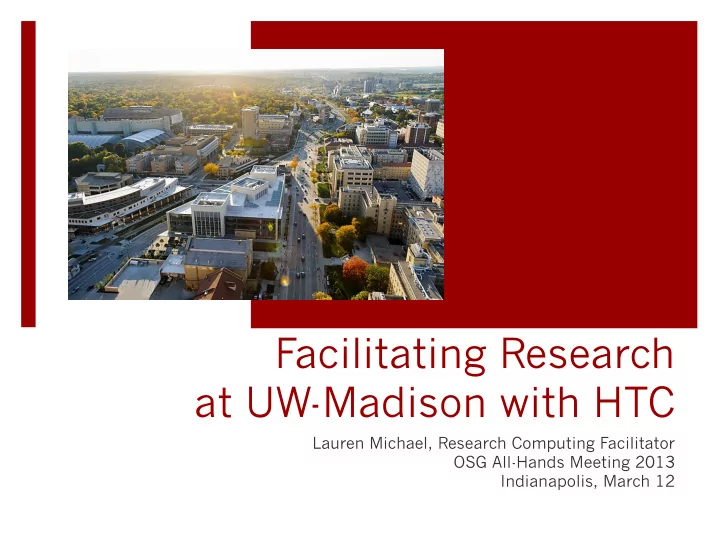

Facilitating Research at UW-Madison with HTC Lauren Michael, Research Computing Facilitator OSG All-Hands Meeting 2013 Indianapolis, March 12
http://chtc.cs.wisc.edu Jun’10- Jun’11- Quick Facts Jul’11 Jul’12 45 70 Million Hours Served 54 106 Research Projects 35 52 Departments 10 13 Off-Campus Last 12 months Projects Users CHTC 126 600+ CHTC to OSG 47 102 OSG to CHTC n/a 736 Researchers who use the CHTC are located all over campus (red buildings)
Campus DHTC Resources C entor for H igh T hroughput C omputing, est. 2006 G rid L aboratories O f W isconsin On-Campus CHTC-managed Dept. OSG CHTC GLOW CHTC submit
Campus Usage CHTC 17.3 Owned (GLOW) OSG 53.2 19.0 Millions of Hours, Last 12 Months Thousands of Hours per Week
CHTC Services ¡ All Free! ¡ Website: chtc.cs.wisc.edu ¡ “Get Started” via webform ¡ Online guides (increasingly) ¡ Consultations & Office Hours ¡ with our Research Computing Facilitators (RCFs) ¡ PI present at initial consultation ¡ One-on-one teaching and check-ups ¡ Ongoing Support ¡ User support: chtc@cs.wisc.edu ¡ Infrastructure support: htcondor-inf@cs.wisc.edu
Other Practices ¡ Resource Management ¡ Buy-in additions to CHTC pool ¡ Project submit nodes ¡ Courses and Seminars ¡ Collaborations softwarecarpentry.org ¡ Grant proposal development ¡ Projects: e.g. “Running Galaxy with HTCondor” ¡ Bosco! ¡ User Management Web App ¡ Creating user accounts ¡ Managing user groups, contact information, consultation history
Useful DHTC Solutions: By Problem ¡ Large I/O (submit node overload) INPUT ¡ Proxy server ¡ Post-scripts remove unnwanted files OUTPUT ¡ Group submit nodes ¡ Environment/Dependency Issues ¡ Options to specify Linux 5 or 6 ¡ Designated compiling machines, interactive slots ¡ Matlab, R, and Python sources and compiling tools drop ¡ Large, complex workflows; repetitive batches submit ¡ Data dropping and automated workflow output
More on Matlab in Zach’s MatLab Measures for DHTC talk at 2pm! Challenges: ¡ Matlab code must be compiled (campus license) ¡ Job may fail, HTCondor returns normal (“0”) ¡ Our most common programming language Solutions: ¡ CHTC compiling tools ¡ DAG job manager and job wrapper ¡ Submit file template, jobs submitted individually ¡ Pre-scripts and post-scripts ¡ Automated output checking and retries
Future Work – CHTC ¡ Website and Online Guide Improvements ¡ Accounting Improvements ¡ jobs by number, code, run time, etc. ¡ number, code, and run time by department ¡ post-consultation user behavior? ¡ HPC Resources – arriving soon! ¡ Collaboration with new Advanced Computing Infrastructure (ACI) ¡ SLURM-managed; 48 nodes X 16 cores X 8GB RAM ¡ Shared Gluster storage, 4 X 36TB ¡ Infiniband connection
Future Work – Campus-Wide in collaboration with ACI ¡ Large - and Small -Scale Computing Services ¡ Communication: central campus website ¡ Support: facilitators, online guides, wikis ¡ Learning: Software Carpentry bootcamps, DoIT software training, softwarecarpentry.org central advertising of UW courses ¡ Interactions: matchmaking, brown-bag discussions, user groups, seminars ¡ Computing, Storage, and Networking Resources ¡ Collaborations and Proposal Development
Science enabled by HTC Neuroscience and Psychological Research
Binaural Hearing and Speech Lab Improving Cochlear Implants Sound 22 electrode 8 nerve Wave(s) signals channels Can patient perception be improved with novel signal transmission to the receiver? 5 x 5000 stimuli signals generated with Matlab (~1 CPU hr each). Stimuli used in clinical trials with CI patients Tyler Churchill and PI Ruth Litovsky unpublished work http://www.waisman.wisc.edu/bhl/
Binaural Hearing and Speech Lab Modeling Auditory Nerve Behavior ~30,000 hair Sound Auditory channels Wave(s) nerve fibers (frequencies) Nerve activity � Model 1 : simulates auditory nerve activity from sound files Frequency, Ear 1 � Model 2 : (in optimization) predicts cognitive perception from output of model 1 Up to 100,000 Matlab jobs per week 1.1 million hrs last year, ~800,000 OSG hrs Frequency, Ear 2 � Tyler Churchill and PI Ruth Litovsky unpublished work http://www.waisman.wisc.edu/bhl/
Modeling Brain Networks Expectation Maximization Algorithm EM algorithm predicts de novo models of connectivity strength and directionality between key brain regions, against EEG data. EEG � Algorithm optimization performed with OSG resources in the lab of Dr. Barry Van Veen , UW-Madison Dept. of Electrical and Computer Engineering. Brain Regions � Used by multiple UW-Madison Psychology and Psychiatry projects to study a variety of mental processes. Results impossible without DHTC. 1.8 million hours, 1.1 million OSG hours in the last 12 months J.Y . Chang, et al , Front. Hum. Neurosci., vol. 6, no. 317, November 2012. http://www.engr.wisc.edu/ece/faculty/vanveen_barry.html
Center for Sleep and Consciousness Imagination vs Perception EM algorithm determined a Perception � Imagination � reverse directionality, from cognition to visual processing, in imagination versus perception. Per subject, per condition, per time: 20 initiations of 20,000 Monte Carlo iterations of the model Data analyzed as periodic, identical large batches. Similar for other studies using Prefrontal cortex, Parietal lobe, Occipital lobe � the EM algorithm. Daniela Dentico, MD PHD and PI Julio Tunoni Dept. of Psychiatry, unpublished work http://tononi.psychiatry.wisc.edu/
Top 5 Tips for Facilitating Research with DHTC 1. Effective Outward Communication 2. Accessible, Organized Support 3. Generalizable Tools (with customization options) 4. Customer Relationships 5. Network of Collaboration
CONTACT US Miron Livny (Director) miron@cs.wisc.edu Brooklin Gore (Manager) bgore@morgridgeinstitute.org Research Computing Facilitators: ¡ Lauren Michael lmichael@wisc.edu ¡ Bill Taylor bt@cs.wisc.edu System Administrators: ¡ Aaron Moate moate@cs.wisc.edu ¡ Nathan Yehle nyehle@cs.wisc.edu General: chtc@cs.wisc.edu
Recommend
More recommend